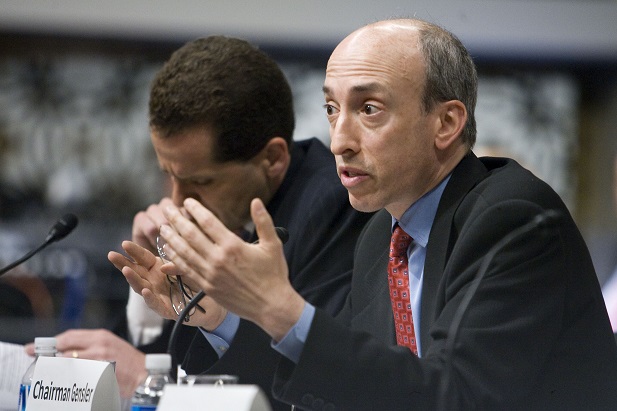SEC Chairman Gary Gensler questioned Tuesday when design elements and psychological nudges associated with digital engagement platforms, or DEPs, "cross the line" and become recommendations.
"The answer to that question is important, because that might change the nature of the platform's obligations under the securities laws," Gensler said Tuesday at the Practising Law Institute's SEC Speaks event.
Recommended For You
"Even if certain practices might not meet the current definition of recommendation, I believe they raise a question as to whether there are some appropriate investor protection guardrails to consider, beyond simply the application of antifraud rules," Gensler said.
These modern DEP features, Gensler continued, "go beyond game-like elements, or what is sometimes called 'gamification.' They encompass the underlying predictive data analytics, as well as a variety of differential marketing practices, pricing and behavioral prompts."
While these developments, he continued, "can increase access and choice, they also raise important public policy considerations, including conflicts of interest, bias and systemic risks."
Predictive data analytics, Gensler said, "including machine learning, are increasingly being adopted in finance — from trading, to asset management, to risk management. Though we're still in the early stages of these developments, I think the transformation we're living through now could be every bit as big as the internet was in the 1990s."
In the case of brokerage apps, robo-advisors or online investment advisors, "when they use certain digital engagement practices, what are they optimizing for?" Gensler asked.
"Are they solely optimizing for our returns as investors? Or are they also optimizing for other factors, including the revenues of the platforms?"
He continued: "To the extent that revenues are in the mix in their optimization functions, that means from time to time, they're going to issue a prompt that will, statistically speaking, optimize their own returns. Further, based on predictive data analytics, I may get different prompts, suggestions or visual cues than another investor will.
Therein lies the tension and the potential conflict. What do we do about that tradeoff?"
For instance, he said, "a robo-advisor might steer us to higher-fee or more complex products, even if that isn't in our best interest."
A brokerage app, meanwhile, "might use DEPs to encourage more trading, because they would receive more payment from those trades. More trading, though, doesn't always lead to higher returns. In fact, the opposite is often true. Or perhaps an app might steer us to high-risk products, options trading, or trading on margin, which may generate more revenue for the platform.
"Digital platforms — from the internet, to mobile phones, to apps — have streamlined user interfaces, enhanced the user experience, and brought greater retail participation into our markets," Gensler continued, and "that, in and of itself, brings a lot of good. But the application of digital analytics raises new questions about conflicts of interest that I think we ought to consider as well."
He noted that "some of these issues can (and will) be addressed under our existing rule sets, or through updates to those rules."
Gensler said he's asked SEC staff to take a close look at the feedback the agency received on the use of new and emerging technologies by financial industry firms as they make recommendations for the commission's consideration, both related to brokers and to investment advisors.
© 2025 ALM Global, LLC, All Rights Reserved. Request academic re-use from www.copyright.com. All other uses, submit a request to [email protected]. For more information visit Asset & Logo Licensing.








